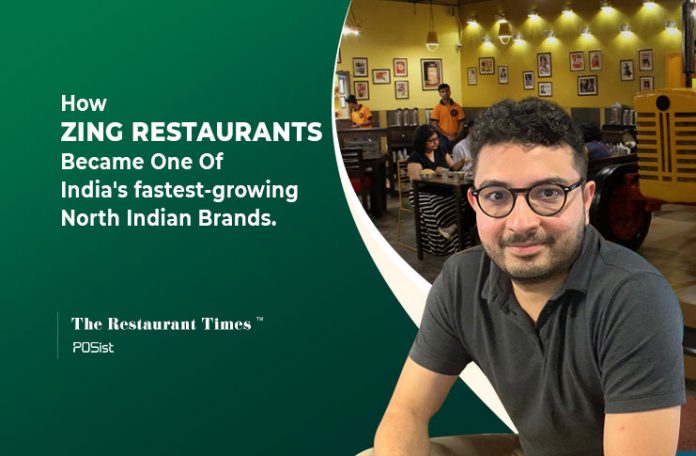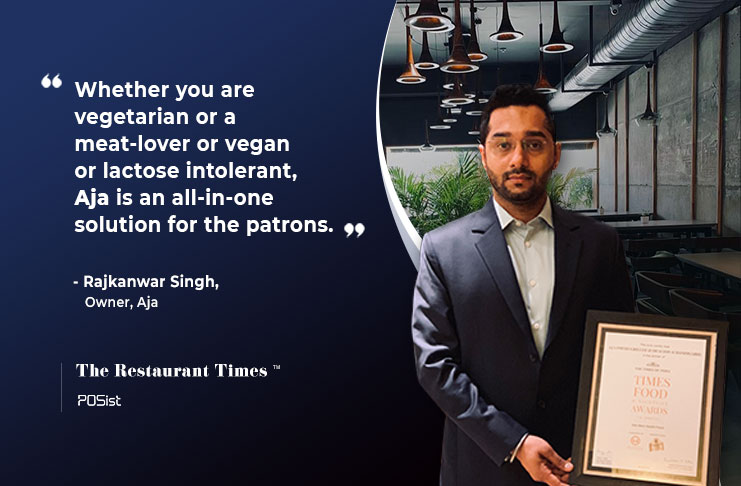Abhimanyu Maheshwari, an entrepreneur by profession has been in the hospitality industry for the past ten years. He initially worked at ‘Azad Hind Dhaba’ in Kolkata, rebranded it, streamlined its operations and developed it into a one-of-a-kind chain of affordable North-Indian restaurants. After gaining experience, he started with his own brand called ‘Zing Restaurants’ in 2011. Zing Restaurants is a full-stack F&B company. It operates a bouquet of restaurant brands, which includes ‘Rang De Basanti Dhaba’, which is amongst India’s fastest growing North Indian Brands.
In Conversation With Abhimanyu Maheshwari of Zing Restaurants
In an exclusive conversation with The Restaurant Times, Abhimanyu Maheshwari talks of his journey in the industry, the story behind Zing Restaurants, the story behind Zing Restaurants, formulating the ‘dhaba’ experience and a lot more.
The Story Behind Zing Restaurants
Zing is an F&B Company based out of Kolkata, which operates multiple brands with distinct value propositions. Their current brands include ‘Barf Soda Paani’, ‘Rang De Basanti Dhaba’ and ‘Rang De Basanti Urban’, along with delivery-only cloud-kitchen brands ‘Deja Bowl’ and ‘Basanti Delivers’.
Zing’s key brand – ‘Rang de Basanti Dhaba’ is the biggest North Indian food brand in East India by volume. Rang de Basanti Dhaba is a modern take on the traditional concept of dhabas. The aim was to recreate the highway dhabas in the vicinity of the city by taking out the shortcomings faced in a highway Dhaba and retaining the positives- taste, and affordability. The kitchens at Rang de Basanti Dhaba are modern and hygienic. ‘Basanti Delivers’ is a cloud kitchen that delivers food from Rang De Basanti Dhaba.
‘Rang De Basanti Urban Dhaba’ offers food that retains the spirit of the classic dhaba in terms of taste, but there is a twist that comes with every item on the menu, or for that matter, every corner of the wall.
‘Barf Soda Paani’ is conceptualized as a neighbourhood pub. Everything in the design has been built to make the entire drinking experience seamless, from the pre-fitted icebox and two taps on each table dispensing unlimited soda and water, to high decibel music.
Formulating The ‘Dhaba’ Experience
Maheshwari addresses the fact that the entire customer journey has been largely kept uncomplicated.
“The cognitive path towards the journey in the outlet has been kept extremely simple and it is not overwhelming at all,” says Maheshwari.
There is a life-size tractor inside the dhaba which symbolizes a prototypical part of every rural home in India. The cuisine promises to make one relive that simple experience of a dhaba. The inspiration towards building ‘Rang De Basanti Dhaba’ has been reaped from several highway dhabas across the country. A dish called Chicken Ghee Roast served at Rang De Basanti is primarily a Mangalorean dish and inspired by their cuisine.
Growth In The Delivery Market For ‘Rang De Basanti Dhaba’
Deja Bowl and Basanti Delivers are a natural extension of the parent brand. According to Maheshwari, Indian food has a wide scope for the delivery business. An NRAI report says that the home/online food delivery market in India represents 25% of the total F&B services pie. The industry report attributes the rapid growth of the industry to factors like changing demographics, increase In disposable income, growing urbanization, internet penetration, and proliferation of online services.
Maheshwari says that there has been a cultural shift in the country. Consumer preferences are continuing to evolve, driving a deeper divide between those seeking convenience and those chasing a memorable dining experience.
Delivery has become a crucial part of the restaurant business. Maheshwari mentions that he worked on elevating the entire delivery experience by doing a lot of research and development. Rang De Basanti primarily serves north Indian food. There was a challenge initially while delivering rotis because they usually became soggy. After working with a lot of packaging partners across the country, Maheshwari finally used the same material that pizza companies deploy while packaging their pizza, as it helps in ventilation and avoids the product from being soggy.
India’s online food-delivery market is currently pegged at $7 billion (Rs 50,375 crore). Global food brands like McDonald’s and Kentucky Fried Chicken, too, are bolstering their tie-ups with food aggregator startups like Zomato and Swiggy, even setting up separate teams to manage these platforms.
Role Of Enterprise Module At Zing Restaurants
Maheshwari has been using Posist at his outlets. He mentions that the enterprise module has been deployed across multiple kitchens and outlets.
“We get the aggregate of all the data on a central level. The data is captured in the enterprise systems. Through data analysis, real-time reports are generated. The reporting analytics team helps in analyzing the reports which further assists in making crucial operational decisions. The purchase module helps in keeping a check on the purchase and acquisition items and monitoring them effectively. It also aids in controlling costs,” says Maheshwari.
Integration with third party food aggregators is very smooth through Posist. It helps in cutting down manual labour and automatically punches orders directly into the POS platform without any assistance. All this finally helps in reducing time and saving costs.
Top Learnings During Maheshwari’s Journey In The Hospitality Industry
- Cost Structure: According to Maheshwari, the cost of your business is a fundamental determinant of success in the restaurant business. A wrong cost structure can lead to its downfall. The rate of failure of restaurants in India is very high. It is essential to keep the fixed costs of the restaurant low.
- Concept and Defining The Market: According to Maheshwari, there is a major difference between a vanity idea and perennial idea in the F&B space. Vanity ideas usually have a shelf life of 6 months but perennial ideas, as the name suggests, never go out of style.
- Major Role Of Online Delivery Platforms: It is imperative to structure the role of online delivery platforms in one’s restaurant business. Having an online presence surely makes you “sparkling visible” to clients who’d otherwise never see an ad or hear about your restaurant. Maheshwari addresses the fact that one should try to find a win-win situation with online delivery aggregators so that one does not lose out on anything!



















